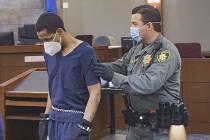No Child law faces questions
No Child Left Behind has always faced criticism from those who see the federal act as an unfunded mandate that turned schools into test-taking factories.
But President Bush and U.S. Education Secretary Margaret Spellings seem to be the last supporters of the 2001 education reform act, said one critic, Joel Packer of the National Education Association in Washington, D.C.
With Bush on his way out and both major presidential candidates pointing to flaws in No Child Left Behind, the future of the law that requires students to demonstrate proficiency in core subjects appears uncertain.
The Clark County School District will release its federally required annual progress report today. Despite the dubious future of No Child Left Behind, education officials expect to have to make the same report for at least two more years.
State Superintendent of Public Instruction Keith Rheault doubts that Congress and the next administration will modify No Child Left Behind before then.
"It's not a high priority," Rheault said.
Education leaders in Nevada have not been silent on No Child Left Behind. Clark County School District Superintendent Walt Rulffes testified in May at a public hearing with Spellings.
Rulffes said he was "against the U.S. Department of Education making last-minute administrative changes under President Bush so that a complete review can be done under our new president."
Rulffes said he also wants to see the federal emphasis shift away from a punishment model to a rewards approach. Under No Child Left Behind, increasingly severe sanctions are imposed on low-performing schools, such as requirements to reconstitute teaching staff or fire administrators.
The act also gives families the option of transferring students out of low-performing schools into better ones.
It's not an opportunity many Clark County families have taken. Last year, students at 41 low-performing public schools in Clark County were given the transfer option. Only 120 students of 30,364 chose to attend a different school.
District officials said students most likely wanted to stay in their neighborhood schools. Rheault suggested that parents have gained perspective about No Child Left Behind and looked more closely at the reasons a school is ranked as low performing.
"It may be because special education or English-as-a-second-language students were not performing as high," he said.
One of the more controversial provisions of No Child Left Behind requires that all children meet the same education goals despite their disabilities or disadvantages.
But education officials have some kind words for No Child Left Behind, which they said prompted public schools to seek greater parental involvement and focus more resources on struggling students. The requirements of the act also have shown that public schools can rise to the occasion -- in 2006-07, Clark County was the nation's only district among the 10 most populous that met all the benchmarks set by the No Child Left Behind Act.
Because all schools must have all students performing at grade level by 2014, school districts have been incrementally raising their target goals from year to year. Last year, Clark County increased the percentage of students who have to show proficiency in core subjects by 12 to 14 percent.
Because of the higher standards, many are expecting "gloom and doom," Rulffes said Wednesday. Instead, "Students have risen to the challenge."
Sue Daellenbach, the district director of testing, said the results coming out today are "not as terrible" as originally thought.
Jesus Garcia, an education professor at the University of Nevada, Las Vegas, said he's bothered by the narrowing of the curriculum to emphasize math, reading and science under the federal act.
Elementary school teachers in his graduate courses often tell Garcia that they're under pressure from principals to stop teaching social studies and the arts so they can prepare students for the standardized math and reading exams that measure proficiency.
Garcia said society is under-valuing the importance of other subjects, such as civics.
"You don't become a citizen," he said. "You have to learn to become a good citizen."
Contact reporter James Haug at jhaug@ reviewjournal.com or 702-799-2922.























